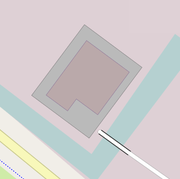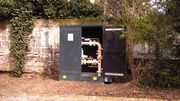Tag:substation=distribution
| Description |
|---|
| Substation that mainly relates to regional distribution networks without any individual subscriber delivery. It often includes sites with regional or local coverage. |
| Group: power |
| Used on these elements |
| Useful combination |
| Status: approved |
| Tools for this tag |
|
A distribution substation is mostly in charge of feeding regional distribution grids or run processes involved in a regional distribution grid.
Such substations aren't able to directly do delivery for individual subscribers and transit capabilities between independent transmission grid sources aren't usually possible nor wanted.
If you're not able to properly study how equipment runs or how networks are connected inside, distribution substations are usually operated by the distribution company of your area and you should look for a visible label from outside.
How to map
See guidelines of power=substation to get more information
Mapping on a node
Distribution substations are generic, simple and sometimes small enough to be mapped as a node, particularly when they are installed in man_made=street_cabinet
It allows to produce concise mapping, with all useful information without much cluttering in the database. As any search of simplification, it's not mandatory and should be used carefully: when too much features are inside the substation, map it as an area and describe each features as independent nodes inside.
On power grids
Approved by Power substations refinement proposal.
A distribution substation is a substation coupled to a medium voltage distribution grid mostly having a voltage between 25 kV and 90 kV and that typically feeds a lower voltage distribution network (e.g. 10 kV) of an area. A distribution substation may be fed from the transmission grid via a transformer (see power=transformer) but provides no switching of transmission power lines (otherwise use substation=transmission). Unless fed from the transmission grid the highest voltage level will typically be 90 kV or lower. The lowest voltage is typically higher than 2.4 kV. A distribution substation does not directly supply households (see minor_distribution) or industrial subscribers (see substation=industrial or even substation=traction).
When mapped as nodes, this value become compatible with transformer=main, compensator=*, voltage:primary=*, voltage:secondary=* and frequency=*.
| Photo | Tagging | OSM Carto | Note |
|---|---|---|---|

|
utility=power barrier=fence power=substation voltage=25000;10000 substation=distribution location=indoor |

|
Indoor 25/10kV substation near The Hague. The entire fenced area should be mapped as a substation, not just the building. |
On pipelines
Approved by Pipeline extension proposal.
A pipeline distribution substation is in charge of lowering the substance's pressure as to feed local distribution grid towards households or industries with medium needs (too low to be directly fed by the transmission grid).
You may find valves there to switch distribution output pipes but without any means to operate on transmission grid. Other equipment may be in charge of pressure regulation or monitoring on behalf of distribution operator.
Such substation may be fed by transmission grid dead-end branch pipes from main pipelines.
| Photo | Tagging | Location | Note |
|---|---|---|---|

|
utility=gas pipeline=substation substation=distribution operator=GRDF |
France | A gas distribution substation in a street cabinet in charge of dropping pressure towards consumers in surroundings.
Upstream network is a higher pressure part of the distribution grid as well. You'll find valves and pressure regulators inside the cabinet |
